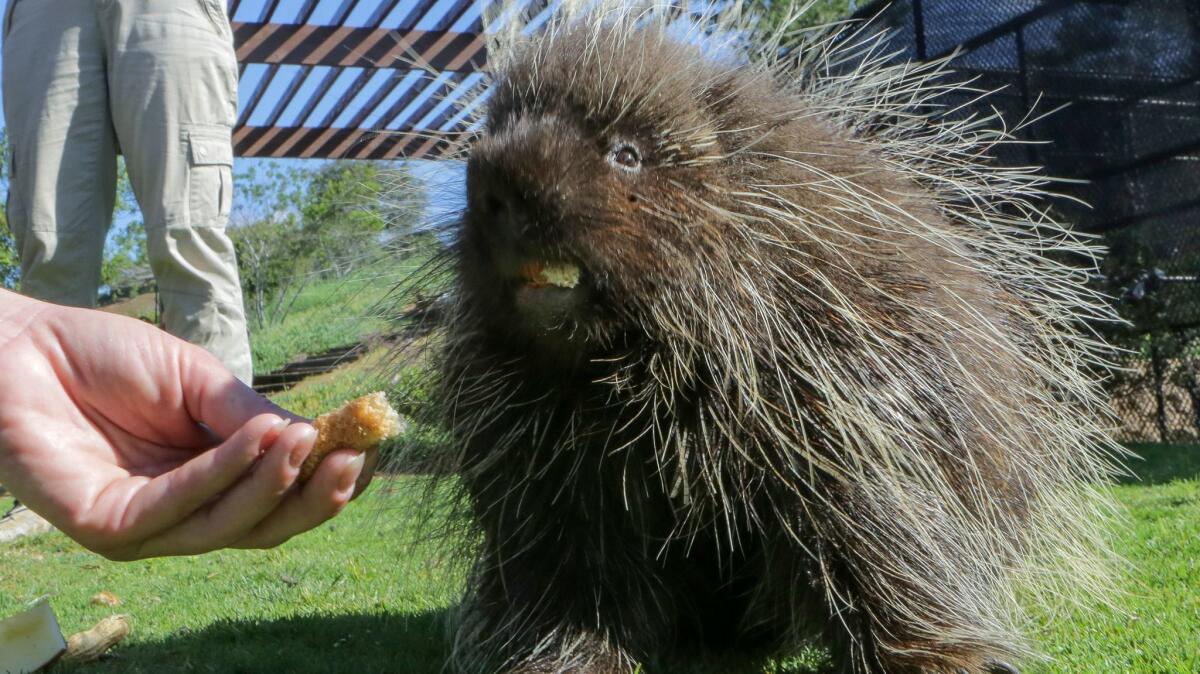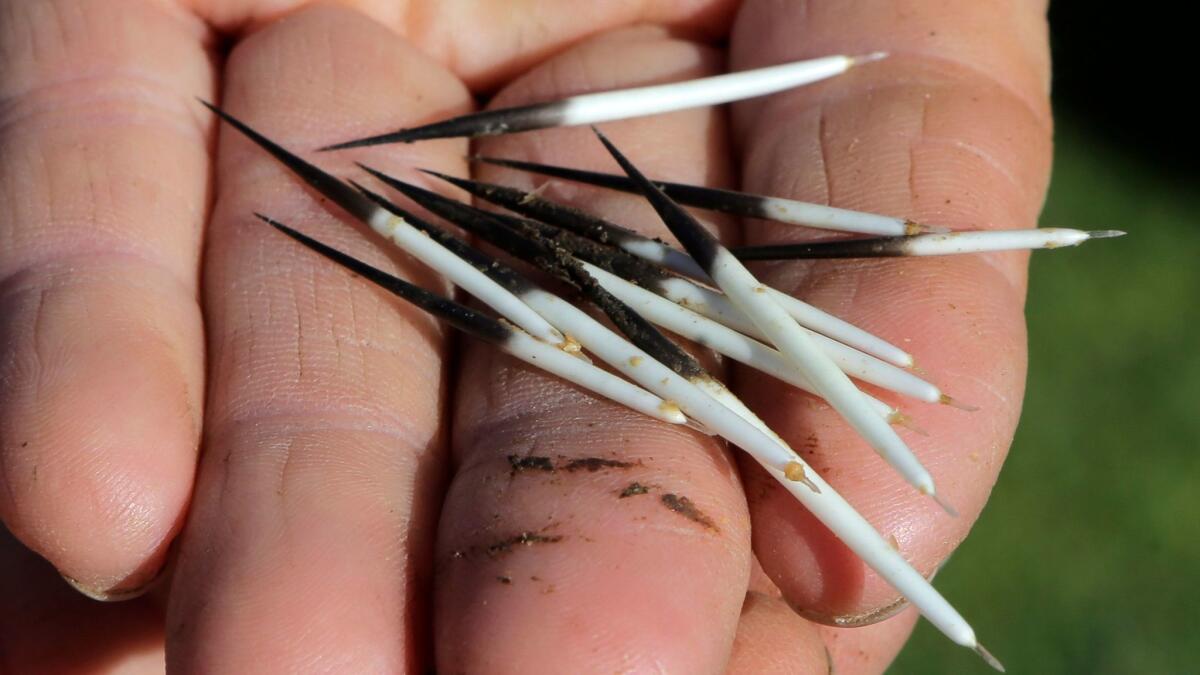Popular porcupine in sharp need of an MRI
- Share via
Bonsall — You can’t blame Penelopea for being a little bit prickly lately.
The 8-year-old North American porcupine has been having an increasingly difficult time balancing, gripping and feeding herself at the Wild Wonders wildlife education center in Bonsall.
To diagnose what’s wrong and determine if surgery’s an option, Penelopea needs an MRI. But the $5,000 scan is beyond the means of the 10-acre for-profit ranch, which supports itself through public education programs.
So, for the first time in the center’s 26-year history, Wild Wonders has put out an appeal for online crowd-funding, and the public has listened. In just the past week, two-thirds of Penelopea’s MRI cost has been raised on Gofundme.com.
Kimberly Wright, co-director and operations manager at Wild Wonders, said there’s no guarantee that Penelopea can be saved, but their goal is to at least give her a chance. Porcupines can live up to 20 years.
“She could still have a long life ahead of her,” said Wright, a marine biologist who joined Wild Wonders in 2004.

Penelopea is one of about 110 animals at Wild Wonders. The ranch was started in 1991 by Jackie Navarro, a wildlife biologist who formerly worked as an educator at the San Diego Safari Park (formerly known as the San Diego Wild Animal Park).
“I thought I’d be out in the wilds of Africa or the tundras of Alaska studying wild animals, but I took a detour into captive animals when I was at the Wild Animal Park many years ago,” Navarro said. “I fell in love with the idea of making captive animals’ lives better. I also fell in love with educating kids about the natural world around us. It just kind of stuck and I stuck with it.”
Over the years, Wild Wonders gradually outgrew locations in Carlsbad and Vista before moving to its present hillside location off Highway 76 in Bonsall. Navarro and her husband live on the property, which employs up to 8 workers and a dedicated corps of 30 volunteers.
The ranch is home to Arctic and Fennec foxes, two cheetahs, a Siberian lynx, parrots, bintrangs, wallabies, alligators, hedgehogs, armadillos, sugar gliders, kinkajous, a cotton-top tamarin, a kookaburra, snakes, snapping turtles and much more. The animals live in shaded enclosures that range in size up to a large hilltop runaround for its two cheetahs.
Wild Wonders didn’t capture any of its animals. Some are surplus animals donated by other wildlife parks and zoos, some were orphaned and some — like the great horned owl — were unable to survive in the wild, after being raised by well-meaning but overwhelmed animal-lovers. Some of the animals were seized by wildlife officials and others were simply abandoned, like the alligator that a landlord unhappily discovered in a former tenant’s bathtub.
“They come from all over,” Navarro said. “We have a new ferret that showed up on somebody’s front doorstep when we had those huge storms a couple weeks back. They’re illegal in California so we gave it a forever home.”

To feed the animals and pay the sometimes exorbitant vet bills (once they topped $17,000 in a single month), Wild Wonders trains virtually all its animals as education ambassadors for its Big Backyard North American Wildlife Education Program.
Staff members host programs at the ranch and take the animals out to classrooms around the region. They’ve also done education tours throughout the U.S. and Canada and have filmed programs with Jeff Corwin of TV’s Animal Planet network.
The animals have also been used to raise money for the National Wildlife Federation, National Geographic, cheetah conservation programs and more.
Not every animal at Wild Wonders takes part in the programs because their temperaments aren’t suited to public interaction. But Penelopea is definitely a “people porcupine.”
“She has the sweetest personality and she’s so gentle,” said Wright, while holding the docile Penelopea on Thursday morning.
Penelopea arrived at the ranch from another zoological center when she was 6 months old. She never grew to full size, has a weak immune system and over time has exhibited signs of a possible neurological disorder.
The symptoms include some tics and an inability to climb, but her condition was stable for many years. In recent months, however, her problems have grown much worse: she can no longer grip her food, so she must be hand-fed; her tics have increased; she has become wobbly on her feet; and she has been dragging a back leg.
“She’s had examinations and blood work but the vets don’t know what’s wrong with her,” Navarro said. “We decided that now, with her symptoms getting worse, we need to do some more diagnostics to see if we can help her in any way.”
Navarro and Wright sand they’ve been overwhelmed by the public’s generosity and hope to have the MRI and some answers soon.
“We’re not sure what we’ll find out,” Wright said, “but if we can help her and give her a better quality of life then it will be worth it.”
More to Read
Sign up for The Wild
We’ll help you find the best places to hike, bike and run, as well as the perfect silent spots for meditation and yoga.
You may occasionally receive promotional content from the Los Angeles Times.







